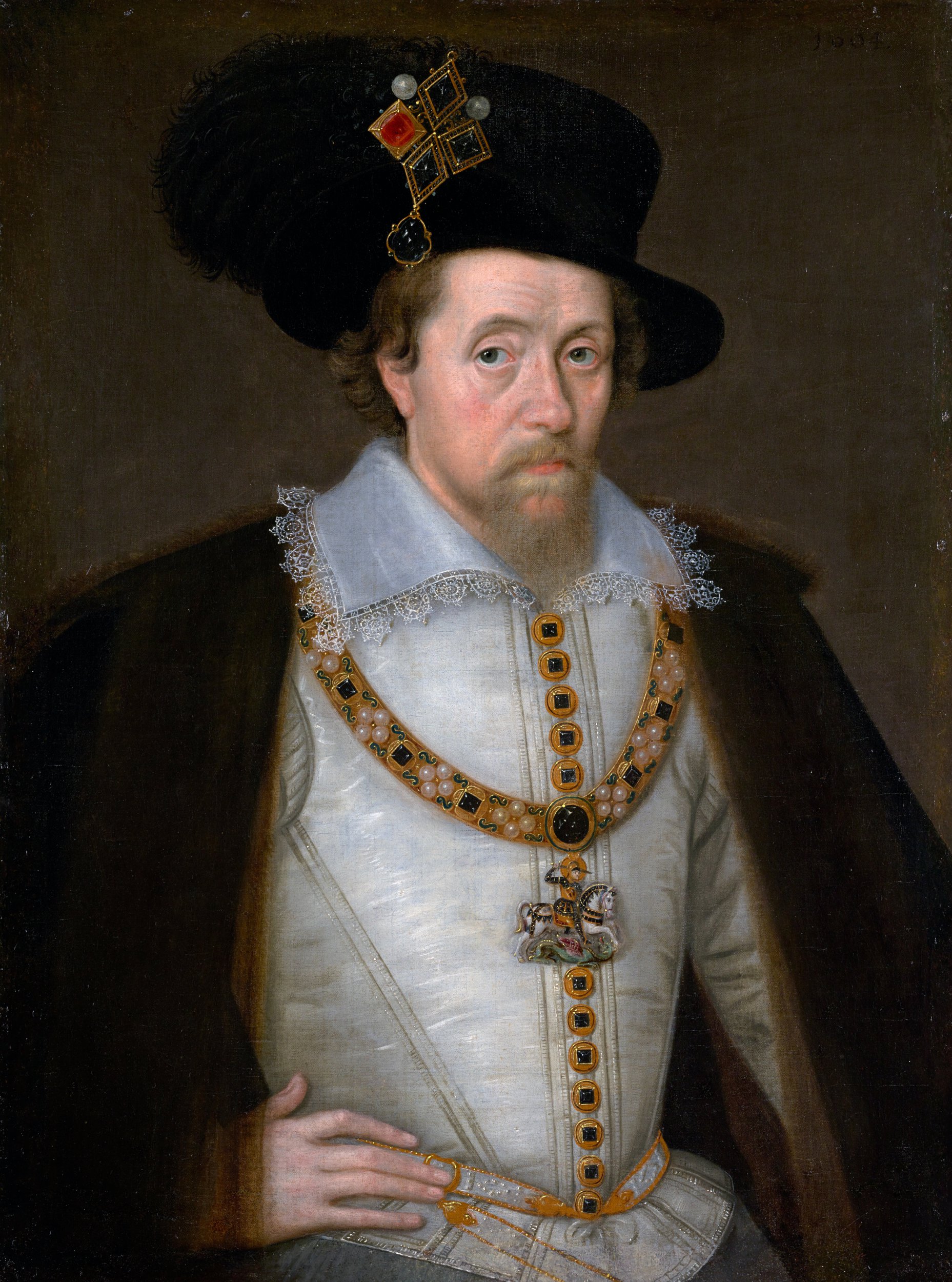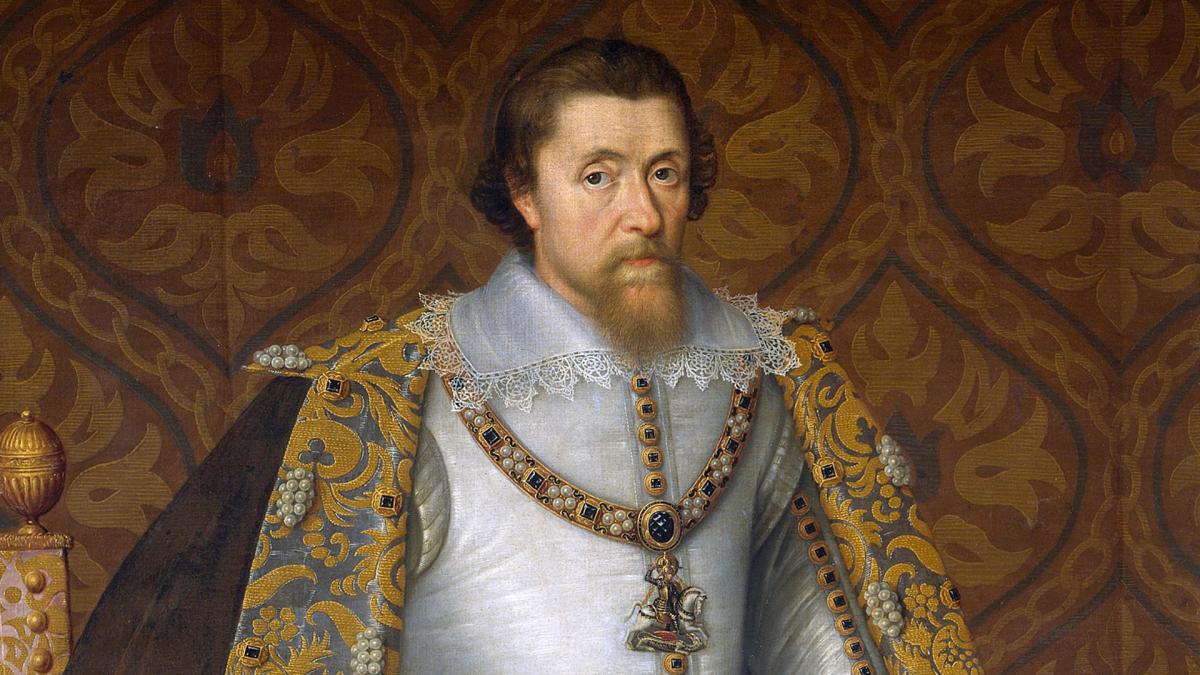When a postmortem examination was performed on King James VI and I in 1625, physicians found “the semyture [skull] … so strong as they could hardly break it open with a chisel and a saw, and so full of brains as they could not, upon the opening, keep them from spilling, a great mark of his infinite judgement”.
We should, perhaps, take the opinions of court doctors with a pinch of salt, but James was highly intelligent and disinclined to keep his thoughts contained. That image of a brain overflowing is therefore perfect. As Clare Jackson writes: “He had a compulsive concern to communicate his thinking, on a repeated basis if necessary.”
The Mirror of Great Britain is the third biography of James that I’ve reviewed this year, the 400th anniversary of his death. Anna Whitelock’s The Sun Rising was disappointing and Gareth Russell’s Queen James delightfully irreverent. There are other volumes in the pipeline, but I’m now done with James. After finishing this beguiling book, there seems no point in reading anything else. It’s the quintessence of James; rather like his big brain, it flows everywhere and is impossible to contain. In research, analysis and imagination, it’s a masterpiece.
James has had a rough ride from historians. This might be due to his unpleasant character, to his homosexuality, or to what Jackson calls “Scotophobia”. The Victorian historian Lord Macaulay described James as “stammering, slobbering, shedding unmanly tears, trembling at a drawn sword, and talking in a style alternately of a buffoon and a pedagogue”. A Spectator book review in 2021 adroitly crammed most of the prejudice against James into a single sentence, referring to “the goggle-eyed, slobbering Scottish king, James, with his peculiar penchant for shitting in the saddle while pursuing his passion for hunting”. The courtier Anthony Weldon complained about his repulsive habit of fondling his codpiece.
Jackson, who won the Wolfson history prize in 2022 for Devil-Land: England Under Siege, 1588-1688, figures that a rehabilitation is overdue. She “seeks neither to valorize nor to denigrate but rather to restore appreciation of the sheer difficulty, intensity and complexity faced by James as ruler of late 16th-century Scotland and as the first British king”. Observed without prejudice, “the king that emerges … is intelligent, resilient, idiosyncratic, irascible, guileful and witty”. Other adjectives could be added, not all of them positive. The predominant emotion that emerges from this book is not necessarily affection, but certainly fascination. “James,” Jackson concludes, “was indeed the first king of Great Britain; he was also, by far, its most interesting.”
• The 21 best history books of the past year to read next
She identifies a prevalent flaw in the histories — the tendency to see James as first a Scottish king and then an English one, without appreciating how the former shaped the latter. She addresses this fault by taking a thematic, rather than linear, approach, showing how his character and kingship evolved as he grew in stature. This inevitably leads to overlap — some topics, like the Gunpowder Plot, James’s homosexuality and the production of the King James Bible, pop up repeatedly — but this is by no means a fault. Jackson’s approach allows the reader to view important issues from different, illuminating perspectives.
Born in 1566, James was crowned king of Scotland at 13 months. Despite the fervent Catholic faith of his mother, Mary, Queen of Scots, his appointed handlers were determined to shape him into Scotland’s first Protestant king. That was a point of contention among Scots, so much so that he had to endure frequent threats of assassination and coup attempts. His cousin, Elizabeth I, reflected that Scotland seemed a “broken state, so full of factions”.
That did not prevent her from naming James as her successor, due in part to what Jackson calls a “Caledonian charm offensive” by James and his representatives. One of Elizabeth’s advisers recalled how a Scottish delegation “demeaned themselves in all things so gallantly, conversed with us so kindly, feasted us so lovingly, embraced us so affectionately”. James, rather ill-advisedly, wrote his elderly cousin a love poem, but she chose to ignore that creepy gesture when deciding on the succession.
James had an ardent belief in the divine right of kings. In his The Trew Law of Free Monarchies (1598), he asserted that a king was “master over every person” and thus possessed “power over the life and death of every one of them”. This belief shaped his approach to parliament after he became king of England in 1603. He reminded MPs that “the state of monarchy is the supremist thing upon the earth: for kings are not only God’s lieutenants upon earth, and sit upon God’s throne, but even by God himself, they are called Gods.”
• Read more book reviews and interviews — and see what’s top of the Sunday Times Bestsellers List
This belief gave him the confidence to intervene when parliament went astray and to govern without parliament for long periods. The MPs were, in his view, mostly a nuisance and frequently a disappointment. For their part, many MPs found the king an abomination. His closest advisers seemed like a Scottish mafia. He showed parliament respect only when asking for money. MPs deplored his dogged attempts to create an Anglo-Scottish union. His hatred of war sometimes seemed like cowardice. They complained that he spent too much time hunting but also that he paid too much attention to parliamentary affairs. Some found his public displays of affection towards men disgusting.
Jackson assumes a thoroughly modern attitude towards James’s sexuality, refusing to sensationalise his fondness for men. She suggests that he was bisexual, but that seems slightly off the mark, since his sexual relations with his wife, Anne of Denmark, seem purposefully aimed at procreation, not pleasure. He advised his son Henry that marriage was designed to satisfy male lust, to produce heirs and provide a man with a “helper”. In truth, James’s lust was satisfied by men. “Never one loved another more than I do thee,” he confessed to his favourite, George Villiers, “and let God leave me when I leave thee.” No similar expressions of affection were directed towards Anne. “Christ had his John,” he wrote, “and I have my George.”

King James VI and I by John de Critz the Elder (c 1606), wearing the Mirror of Great Britain jewel
NATIONAL GALLERIES OF SCOTLAND
The title of this excellent book comes from a portrait painted shortly after James’s accession to the English throne, in which he wears a prominent hat jewel called the “Mirror of Great Britain”. The adornment, Jackson feels, “offered opulent symbolic endorsement of James’s vision of a united Britain”. She goes on to riff on the subject of mirrors — still a novelty in Jacobean Britain. Her mirrors are sometimes cloudy, sometimes distorted, occasionally perfectly clear. They reflect the complexities of an enigmatic king and of the equally baffling nation over which he reigned. Jackson confesses that she is “as interested in the fragile and vulnerable dimensions of this king’s life as in its more brilliantly gilded or sharply jagged aspects”. In her mirror one views a life perfectly rendered — complete, complex and awe-inspiring.
The Mirror of Great Britain: A Life of James VI & I by Clare Jackson (Allen Lane £35 pp560). To order a copy go to timesbookshop.co.uk. Free UK standard P&P on orders over £25. Special discount available for Times+ members
